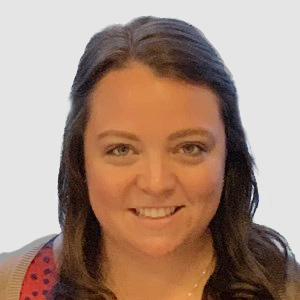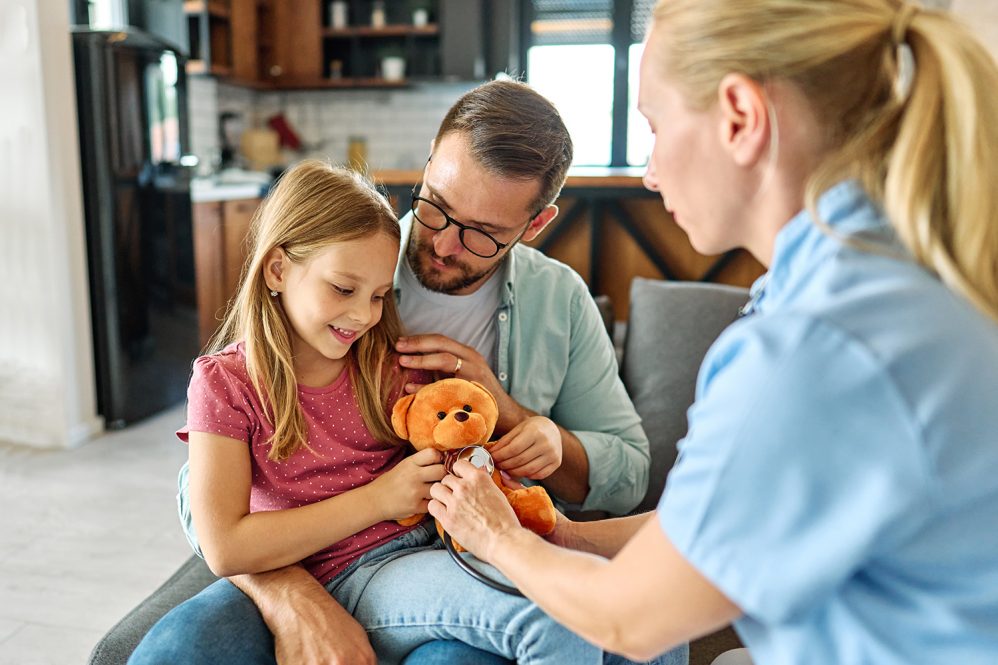When a child is critically ill, families often face one of the most heartbreaking questions imaginable: how should a medical team intervene when a patient’s heart stops beating or they are unable to breathe independently?
Traditionally, families are asked to state their wishes directly. But UConn School of Social Work Ph.D. student Laura Moynihan, LICSW, OSW-C, APHSW-S, and her colleagues have found that many parents want the medical team to help guide them—especially when it comes to stopping aggressive treatments that are unlikely to change how a person’s disease progresses.
A More Compassionate Approach

Moynihan is part of a research team studying a method known as informed non-dissent, designed to ease the burden of decision-making for families. Earlier this year, Moynihan and colleagues from Brown University and HopeHealth presented a literature review and case series they are working to publish (the abstract is included in the May 2025 issue of the Journal of Pain and Symptom Management), on the use of this technique.
“Informed non-dissent involves the medical team bearing the burden of recommending that life-saving measures, such as resuscitation, should not be attempted,” Moynihan explains. “Families remain part of the process, but they don’t have to voice a devastating ‘no.’ Instead, they are given the space to disagree if they wish.”
The team studied six cases of children with serious illnesses, from toddlers to young adults. In five of the cases, families accepted the approach and agreed with the physician’s recommendation. In one case, the family disagreed, and the care team continued discussions until collectively, they made a plan.
“This research demonstrates that using an informed non-dissent approach is both ethical and accepted by families,” Moynihan says. “It allows families to stay involved, reduces feelings of guilt, and helps doctors provide care that is compassionate, honest, and aligned with what families want for their children.”
Giving Young Patients a Voice
Moynihan’s research builds on her earlier work with advance care planning tools for adolescents and young adults facing life-limiting conditions. In January 2025, she and a multi-institutional team led by Lori Wiener, Ph.D., at the NIH published findings in the Journal of Palliative Medicine evaluating a revised version of Voicing My CHOiCES (VMC), a widely used guide to help young patients express their wishes about medical care and quality of life.
The revised tool added sections on identity, reflections, children or dependents, and legacy messages—moving beyond checkboxes to more personal storytelling. Nearly all of the young participants said the updated guide felt more relevant and supportive, with 95% reporting it helped them think about what mattered most in their care.
“These young people told us clearly: they want a say in their care, but they also want to be remembered as whole people—beyond their illness,” Moynihan says.
This research demonstrates that using an informed non-dissent approach is both ethical and accepted by families. — Laura Moynihan
Insights from Clinical Practice
As a practicing clinical social worker in pediatric oncology, Moynihan brings direct experience to her scholarship. She works with children, adolescents, and young adults navigating not only treatment decisions but also the everyday milestones of adolescence and young adulthood—school, work, dating, and independence.
For patients with uncertain prognoses, those decisions can be agonizing. Moynihan recalls working with a 17-year-old with leukemia who struggled to decide whether to attend college or work after high school. “If he was going to live only a year, he wanted to work and spend time with family. If he was going to live 10 years, he wanted to go to college. But because he didn’t know, he felt paralyzed,” she explains.
Making a Difference
Recognizing how common this struggle is among adolescents and young adults with cancer, Moynihan entered the School of Social Work Ph.D. program with a clear research agenda: to better understand these decision-making processes and develop interventions that support patients and families. Her dissertation is tentatively titled “Influences on Decision-Making Among Adolescents and Young Adults with Uncertain or Poor Cancer Prognoses.”
“Our program trains scholars to address critical social problems through justice-informed research,” says Cristina Mogro-Wilson, Zachs Endowed Professor and director of the SSW Ph.D. program. “Laura’s work exemplifies this mission—bringing her clinical expertise in pediatric oncology to examine how families and young people navigate the hardest medical decisions with compassion, dignity, and equity.”
Moynihan earned her BA in public health from Brown University and her MSW with a focus on integrated medical and behavioral health from the University of Michigan. She has worked as a clinical social worker in adult and pediatric nephrology and now in pediatric oncology for almost a decade, where she collaborates with interdisciplinary medical teams. Her goal is to bring greater attention to psychosocial care within medical education and practice—“ensuring that families facing serious illness receive support that honors both their humanity and their choices,” she says.



